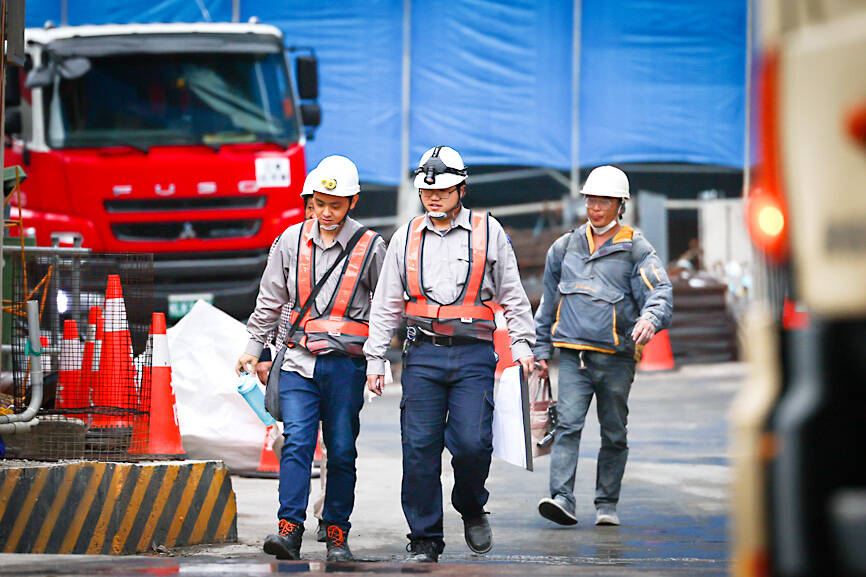A rebounding manufacturing sector brought the number of workers on formal unpaid leave programs in Taiwan below 10,000 as of Thursday, the Ministry of Labor said yesterday.
Data compiled by the ministry showed the number of workers on unpaid leave programs dropped from 10,348 to 9,146 between the 30th last month and Thursday.
Meanwhile, 60 firms brought furloughed employees back to work, reducing the number of employers with formal unpaid leave programs in place to 351, the ministry said.

Photo: CNA
Over 85 percent of those brought back from furlough programs worked in the export-oriented manufacturing sector, it said.
Speaking with reporters, the ministry’s Labor Conditions and Equal Employment Division deputy head Wang Chin-jung (王金蓉) said that firms involved in metals and electric machinery, as well as light manufacturing, had seen their order books rebound following a period of weak global demand.
The number of furloughed employees in the metals and electric machinery industry fell by 842, most of whom worked for machine tool firms and molding suppliers, Wang said.
Meanwhile, 144 furloughed light industry workers were brought back from unpaid leave programs, she said.
Despite the rebound, the manufacturing sector accounted for about 90 percent of those on furlough programs, the ministry said.
According to the ministry, 8,247 of the 9,146 employees still on formal unpaid leave programs worked in manufacturing.
The sector also accounted for 199 of the 351 firms with furlough schemes in place, down from 232.
With private consumption solid in the post-COVID-19 era, the service sector job market remained relatively stable, it said.
Between the 30th last month and Thursday, the number of furloughed retail and wholesale industry workers fell to 732 from 880, it said.
The number of workers placed on unpaid leave in the warehousing and logistics lodging industry stayed at two, while the figure in the lodging and food and beverage industry fell to two from three, the ministry said.
In addition, the number of furloughed workers in the support service industry, which is comprised of travel agencies, rose to 61 as of Thursday, up from 53 as of the 30th last month, the ministry said.
The ministry updates its furloughed worker data on the 1st, 8th, 16th and 24th of every month, and reports the number of employees placed on furlough by companies registered with the ministry.
Most firms implementing furlough programs are small enterprises that employ fewer than 50 people, it said.
Unpaid leave programs typically last for less than three months, with employees taking five to eight days of unpaid leave per month, it said.

Semiconductor business between Taiwan and the US is a “win-win” model for both sides given the high level of complementarity, the government said yesterday responding to tariff threats from US President Donald Trump. Home to the world’s largest contract chipmaker, Taiwan Semiconductor Manufacturing Co (TSMC, 台積電), Taiwan is a key link in the global technology supply chain for companies such as Apple Inc and Nvidia Corp. Trump said on Monday he plans to impose tariffs on imported chips, pharmaceuticals and steel in an effort to get the producers to make them in the US. “Taiwan and the US semiconductor and other technology industries

SMALL AND EFFICIENT: The Chinese AI app’s initial success has spurred worries in the US that its tech giants’ massive AI spending needs re-evaluation, a market strategist said Chinese artificial intelligence (AI) start-up DeepSeek’s (深度求索) eponymous AI assistant rocketed to the top of Apple Inc’s iPhone download charts, stirring doubts in Silicon Valley about the strength of the US’ technological dominance. The app’s underlying AI model is widely seen as competitive with OpenAI and Meta Platforms Inc’s latest. Its claim that it cost much less to train and develop triggered share moves across Asia’s supply chain. Chinese tech firms linked to DeepSeek, such as Iflytek Co (科大訊飛), surged yesterday, while chipmaking tool makers like Advantest Corp slumped on the potential threat to demand for Nvidia Corp’s AI accelerators. US stock

The US Federal Reserve is expected to announce a pause in rate cuts on Wednesday, as policymakers look to continue tackling inflation under close and vocal scrutiny from US President Donald Trump. The Fed cut its key lending rate by a full percentage point in the final four months of last year and indicated it would move more cautiously going forward amid an uptick in inflation away from its long-term target of 2 percent. “I think they will do nothing, and I think they should do nothing,” Federal Reserve Bank of St Louis former president Jim Bullard said. “I think the

SUBSIDIES: The nominee for commerce secretary indicated the Trump administration wants to put its stamp on the plan, but not unravel it entirely US President Donald Trump’s pick to lead the agency in charge of a US$52 billion semiconductor subsidy program declined to give it unqualified support, raising questions about the disbursement of funds to companies like Intel Corp and Taiwan Semiconductor Manufacturing Co (台積電). “I can’t say that I can honor something I haven’t read,” Howard Lutnick, Trump’s nominee for commerce secretary, said of the binding CHIPS and Science Act awards in a confirmation hearing on Wednesday. “To the extent monies have been disbursed, I would commit to rigorously enforcing documents that have been signed by those companies to make sure we get